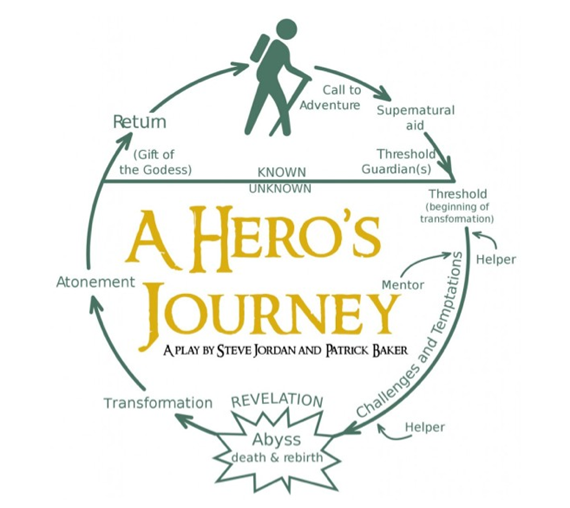
The story I told on stage regarding my addiction was the raw and honest truth. However, I feel that it might also give the perception that I am at the end of my difficult journey, and that I have successfully recovered. In my high school literature class, we learned about something called a "hero's journey." It is the story arc behind the majority of novels and movies, where the main character undergoes a death and rebirth, and then comes back home to safety and happiness.
While I do believe that it is possible for individuals to go through a very difficult and transformational time of their lives and then re-emerge feeling stronger than ever before, I do not believe that the end feels like a safety net. I do not believe that there is an end. I simply believe that each and every one of us as humans are on a "hero's journey," and we are simply at different parts of the journey. Looking at the chart below, I have decided that I am at the "Threshold," the beginning of the transformation. I still have many challenges and temptations.

Let me put things into perspective. A week after I returned from giving my Ted talk in London, I relapsed. Yes, after I stood on stage telling everyone my story -- how much I had gone through, and how hopeful I was -- I gave in to my demons and relapsed. At that point I was receiving a large inbound of messages from everybody telling me how strong I was, how proud they were of me for sharing my story, for getting healthy. At one moment back home in San Francisco, I remember binging on food, while simultaneously writing a reply to a girl who had seen my speech in London and was asking for my advice on how to recover. Man, that was hard. My guilt and shame filled my entire body. "How could I still be relapsing when I just gave this powerful talk which apparently gave the impression that I was recovered? How can I be giving recovery advice when I am still at the very beginning of my own recovery?"
And then I stopped and thought -- the point of my speech was simple. "When you talk about your demons, they lose their power." But when I got back home to San Francisco, I was doing the opposite of that. As I sat at home relapsing, I was hiding in a little cocoon behind my lonely computer screen, pretending to the world that I was doing great even though I clearly was not. The demons were quickly gaining power again. So I literally had to re-watch my own speech, get inspired by my own advice, and get back on track. It's funny how your brain can have two sides -- one so seemingly rational and astute, and the other a mess of distress. I seem to tether back and forth between the two -- the anxious and confused brain constantly having to refer back to the rational brain to see what needs to be done. So what did I do? I reached out, spoke to my friends and my "mentors" as they call them in the Hero's Journey, and the demons lost their power once again. I got right back on track.
Now I do have some advice: Once you get back on track, when your rational mind is at its strongest, it is important to figure out what exactly brought you to your point of relapse, and then find tangible solutions to avoid these triggers. You can't simply leave it up to fate that these demons will not appear again in maybe a few days, a week, a month. You absolutely need a solution. Maybe the solution that you come up with will not be the right one, and maybe you will relapse again, but it is obvious after a relapse that something needs to change. For me, what did I realize? I realized that being a violinist is a wonderful job to have, but also a very lonely job, and for an addict isolation is the greatest cause of a relapse. I realized that I have many other passions that are equal if not greater than music, and I do not need to choose one or the other. Therefore, in addition to my violin gigs, I will begin a career where I can be constantly surrounded with friends and colleagues.
I am nothing short of excited for my future right now. I know that the journey ahead of me is going to be tough. I will probably have hundreds of "revelations" on my hero's journey, and hopefully I can write about all of them. After writing this blog post, my very first published post on the internet, I actually feel some sense of relief and contentment. I feel as if I have released many of my demons just by writing about it and knowing that it will be read. Hmmm... Solution #2 for my recovery: Continue these blog posts!
- Gabi/@gabiviolin14